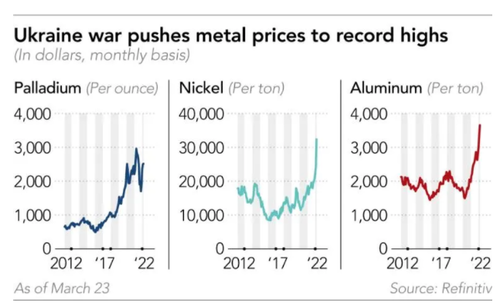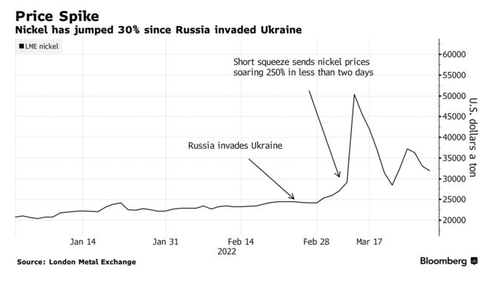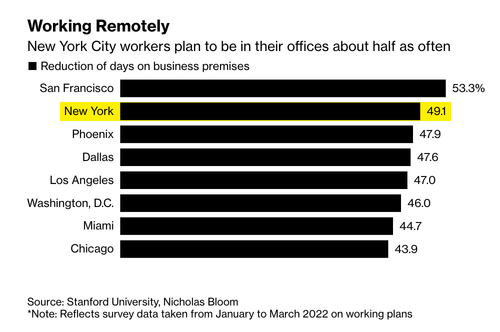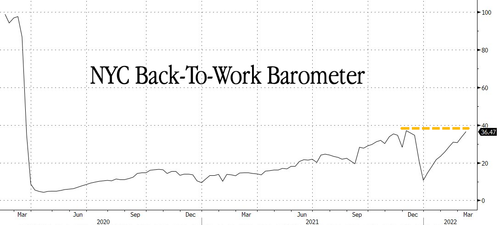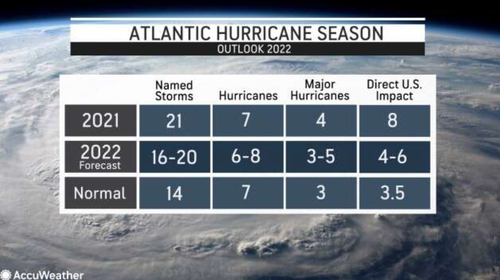Authored by Derrick Broze via TheLastAmericanVagabond.com,
While much of the “mainstream” world has spent the last week obsessing over and debating the celebrity spectacle surrounding American actor Will Smith slapping American comedian Chris Rock, the international elitists were meeting in Dubai for the 2022 World Government Summit.
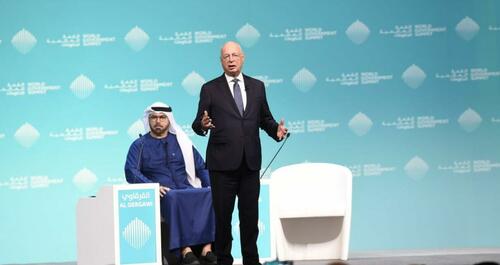
From March 28th to the 30th, corporate media journalists, heads of state, and CEOs of some of the most profitable companies in the world met for discussions on shaping the direction of the next decade and beyond. Anyone with a functioning brain should ignore the tabloids and instead pay attention to this little known gathering of globalist Technocrats.
Let’s take a look at the speakers and the panels, starting with Mr. Great Reset himself, Klaus Schwab, founder of the World Economic Forum.
Schwab gave a talk entitled, Our World Today… Why Government Must Act Now?. “Thank you, to his excellency for enabling this initiative to define a longer-term narrative to make the world more resilient more inclusive and more sustainable,” Schwab stated during his address. The use of the term narrative is important because in January 2021, Klaus and the World Economic Forum announced the next phase of The Great Reset, The Great Narrative.
As with The Great Narrative event, the World Government Summit was also held in Dubai. As I wrote during the Great Narrative meeting:
“While the political leaders of the UAE and Klaus Schwab may promote themselves as the heroes of our times, we should judge them according to their actions and the company they keep, not the flowery language they use to distract us. The simple fact is the UAE has a horrible record on human rights. The nation is known for deporting those who renounce Islam, limited press freedoms, and enforcing elements of Sharia law.”
During Schwab’s short talk he also mentioned his pet project “the 4th Industrial Revolution“, which is essentially the digital panopticon of the future, where digital surveillance is omnipresent and humanity uses digital technology to alter our lives. Often associated with terms like the Internet of Things, the Internet of Bodies, the Internet of Humans, and the Internet of Senses, this world will be powered by 5G and 6G technology. Of course, for Schwab and other globalists, the 4IR also lends itself towards more central planning and top-down control. The goal is a track and trace society where all transactions are logged, every person has a digital ID that can be tracked, and social malcontents are locked out of society via social credit scores.
Immediately following Schwab was a panel which made no attempt to hide the goals of the globalists. The panel, Are We Ready for A New World Order?, featured Fred Kempe, president and CEO of the Atlantic Council since 2007, as well as an anchor for CNN and a former advisor to former US president George W. Bush. Before joining the Council, Kempe was a prize-winning editor and reporter at the Wall Street Journal for more than 25 years.
In fact, the Atlantic Council had a fairly large presence at the World Government Summit, including appearances by Defne Arslan, senior director of the Atlantic Council IN TURKEY program, and Olga Khakova, Deputy Director of Global Energy Center of Atlantic Council.
For those who are unfamiliar with the Atlantic Council, I first reported in May 2018 that Facebook had partnered with the thinktank connected to NATO. I wrote:
“The Atlantic Council of the United States was established in 1961 to bolster support for international relations. Although not officially connected to the North Atlantic Treaty Organization, the Atlantic Council has spent decades promoting causes and issues which are beneficial to NATO member states. In addition, The Atlantic Council is a member of the Atlantic Treaty Organization, an umbrella organization which “acts as a network facilitator in the Euro-Atlantic and beyond.” The ATO works similarly to the Atlantic Council, bringing together political leaders, academics, military officials, journalists and diplomats to promote values that are favorable to the NATO member states. Officially, ATO is independent of NATO, but the line between the two is razor thin.
Essentially, the Atlantic Council is a think tank which can offer companies or nation states access to military officials, politicians, journalists, diplomats, etc. to help them develop a plan to implement their strategy or vision. These strategies often involve getting NATO governments or industry insiders to make decisions they might not have made without a visit from the Atlantic Council team. This allows individuals or nations to push forth their ideas under the cover of hiring what appears to be a public relations agency but is actually selling access to high-profile individuals with power to affect public policy. Indeed, everyone from George H.W. Bush to Bill Clinton to the family of international agent of disorder Zbigniew Brzezinski have spoken at or attended council events.”
Less than 6 months after Facebook and The Atlantic Council announced their partnership, more than 500 FB pages were accused of being “Russian disinformation” and deleted. The pages largely consisted of anti-war, police accountability, and independent journalism outlets. These pages and journalists directly challenged the narratives spun by the Atlantic Council stooges.
Dissecting the World Government Summit: Ukraine, SDGs, ESG, Blockchain, and AI
While many of the names in attendance might be unfamiliar to a western audience, the speakers are men and women who absolutely play a vital role in international geopolitics.
Some of the featured speakers include:
-
– António Guterres, Secretary General of United Nations, giving a talk tiled Is Our World Today… Our World of Tomorrow?
-
– Dr. Tedros Ghebreyesus, Director General of World Health Organization
-
– David Pekoske, Administrator of USA Transportation Security Administration
-
– Dr. Kaitlyn Sadtler, an American immunologist and bioengineer and Stadtman Tenure-Track Investigator at the National Institute of Biomedical Imaging and Bioengineering, part of the US NIH. She gave a presentation about Re-engineering Immunity with Next Generation Technologies
-
– H.H. Sheikh Sabah AlSabah, Prime Minister of Government of the State of Kuwait
-
– Jeon Hae cheol, Minister of the Interior and Safety of Government of the Republic of Korea
-
– Supattanapong Punmeechaow, Deputy Prime Minister and Minister of Energy of Secretariat of the Prime Minister of Thailand
-
– Mrs. Belinda Balluku is the Minister of Infrastructure and Energy of the Republic of Albania
-
– Mohammad Sanusi Barkindo Secretary General of OPEC, speaking about “Oil and Gas in a Net-Zero World“
The Russia-Ukraine conflict was also part of the discussions. Notably, Maxim Timchenko, CEO of DTEK, made an appearance. His bio states, “under his leadership, DTEK has evolved from a regional conventional energy company into Ukraine’s largest private investor as well as leading energy company.”
The appearance of Mr. Timchenko should not be overlooked, especially because he appears in a discussion called Post-Crisis Ukraine: New Energy for a New Europe, featuring Olga Khakova of the Atlantic Council, and Paula Dobriansk, Senior Fellow, Harvard Kennedy School of Government of Atlantic Council. Again, the presence of the Atlantic Council should not be taken lightly. They are the representatives of the Western Bloc of the New World Order.
The Russia-Ukraine conflict also factors into another panel title, Getting Off Russian Gas: Practical Steps for Europe, featuring more of the Atlantic Council goons, including Richard Morningstar, Founding Chairman of Global Energy Center, Atlantic Council, and Phillip Cornell, Senior Fellow of Global Energy Center, Atlantic Council.
The World Government Summit also spent considerable time discussing the United Nations Sustainable Development Goals (SDGs) which form the core of the Agenda 2030, itself part of The Great Reset agenda. Some speakers discussing the SDGs include:
-
– Dr. Mahmoud Safwat Mohieldi, the United Nations Special Envoy for the 2030 Finance Agenda, who is speaking on a panel about Arab Nations and the UN Sustainable Development Goals.
-
– María Sandoval, First Lady of Colombia of Government of Republic of Colombia, discussed “The Role of Women in Achieving the SDGs“. The first day of the summit was actually dedicated to the role women will play in rolling out the so-called New World Order and global governance schemes. Sandoval celebrated the fact that Colombian President Ivan Duque launched “the first national development plan that was directly aligned with the SDGs, and this of course was something that provided a wider spectrum for women to act react and participate in these achievements of the SDGs.”
-
– Catherine Russell, Executive Director of United Nations Children Fund, participated in a panel titled SDGs for Every Child
The Summit also addressed the Environmental, Social, and Governance criteria (ESG) promoted by the UN in a panel entitled, Where does ESG Go From Here?. ESG investing is also sometimes referred to as sustainable investing, responsible investing, or socially responsible investing (SRI). The practice has become an increasingly popular way to promote the SDGs. The panel featured Neil R. Brown, Managing Director, KKR Global Institute and KKR Infrastructure. KKR Global Institute is the same organization that former US Army General and former CIA Director David Petraeus joined in 2013.
Additionally, a panel entitled, Is the World Ready for A Future Beyond Oil?, featured H.E. Suhail bin Mohamed AlMazrouei, Minister of Energy and Infrastructure of Ministry of Energy and Infrastructure; H.R.H Prince Abdulaziz Al Saud, Minister of Energy of Ministry of Energy – Kingdom of Saudi Arabia; and H.E. Masrour Barzani, Prime Minister of Kurdistan Regional Government.
Blockchain and Artificial Intelligence are a major piece of the Technocratic vision for 2030, so naturally there were several discussions on the use of blockchain, AI, and even 6G (the eventual successor to 5G technology).
There was a discussion on blockchain technology in a panel entitled, The Future of Blockchain… A Perspective from Industry Pioneer, featuring Changpeng Zhao, Chief Executive Officer of Binance, among others. Other panels focused on De-Fi (decentralized finance) featured Jamie Crawley, Editor in Chief of Coin Desk, and Charles Hoskinson, Co-Founder of Ethereum. I have recently reported on Hoskinson’s statements regarding using blockchain to implement ESG and SDG programs and the danger they pose to privacy and liberty.
There was also a panel focused on the introduction of Central Bank Digital Currencies entitled, CBDCs and Stablecoins: Can They Co-Exist?. The CBDCs schemes being rolled out in nations around the world are a crucial component of The Great Reset.
One panel focuses on a concept called Human Meta-Cities, which sound like a rebranding or updating of the so-called Smart Cities. The panel description states,
“in a world of change and rapid technological development, we shed light on a new vision for planning future cities centered around human needs and aspirations. This new framework will help governments refine their role in planning the new world taking advantage of the digital transformation opportunities that are taking place.”
Another panel which makes clear the Technocratic dream was entitled, The Invisible Government: Eliminating Bureaucracy Through Technology. The description of the panel states:
“Technology is creating new possibilities as it simplifies processes, enables instant feedback, and ultimately improves customer experience. In the public sector, digitalization and artificial intelligence are creating a new model of governance – “invisible” governments that are more agile, responsive, human-centric, and data-driven. In this session, global policymakers and experts will share their bold vision and experience in utilizing technology to eliminate bureaucracy and innovate government services for the future.”
What goes unsaid in the panel description is that making the government “invisible” will actually lead to a world of no accountability for government and politicians. In reality, the Technocrats imagine a world where the tyrannical technological systems are invisible and the average person has zero recourse for preventing exclusion or punishment based on their social credit score.
This is the world these technocrats — many of whom are unelected — envision. The only way this vision will not come to pass is if the people of the world throw their televisions away, ignore the celebrity drama, and start exiting from these slavery systems.



